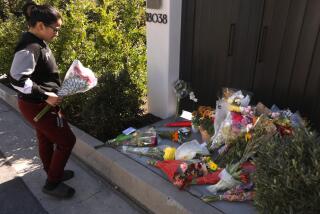Scot Pleads Guilty in Sale of Equipment to Libyans
- Share via
Francis George Christie, the Scottish businessman who channeled petrochemical equipment made at a San Diego firm to Libya in violation of a U.S. trade embargo, pleaded guilty in federal court Monday in San Diego to conspiring to defraud the federal government.
In a plea-bargain arrangement with Assistant U.S. Atty. Phillip Halpern, Christie agreed to plead guilty to one count of fraud and to cooperate with the government in its case against a Louisiana couple from whom Christie and his partners allegedly bought oil field equipment for transshipment to Libya.
In return, 10 other counts against Christie relating to the shipment of goods to Libya have been dropped.
Halpern also will recommend that Christie be given less than the maximum five-year prison sentence and $250,000 fine. The terms of the recommendation will depend, in part, on how helpful Christie is in the case against Cheryl and George Smith of Gretna, La., the operators of Oil Patch Services Inc.
Sentencing Scheduled
The Smiths’ trial is scheduled to begin Sept. 29 in San Diego, and Christie’s sentencing was tentatively scheduled for Oct. 5. The sentencing may be postponed if the Smiths’ trial has not been concluded by then.
Halpern said Christie’s guilty plea proves that the government was not wrong in going after the Scot, who did not violate any laws in his own country.
“Perhaps even more so abroad, people questioned the appropriateness of bringing charges against a Scottish national,” Halpern said. “We certainly view (the guilty plea) . . . as a vindication of the government’s position on this issue.”
A U.S. Customs Service agent posing as an employee of the San Diego-based Solar Turbines Inc. lured Christie to the United States in January with the enticement of a $5 million-$7 million equipment deal with Oil Patch. Federal agents arrested Christie in New Orleans Jan. 8.
Following terrorist attacks in the Rome and Vienna airports, which the Reagan Administration blamed on Libyan leader Col. Moammar Kadafi, the President issued an executive order 18 months ago banning virtually all contact between American companies and Libya. The administration urged U.S. allies to impose similar bans on trade with Libya, but none did so.
However, because most of Libya’s oil fields were developed by U.S. companies, the North African country remains highly dependent on American-made spare parts.
Federal officials say that the Smiths used Oil Patch to buy petrochemical equipment from various U.S. companies--including Pratt & Whitney Co. and Solar Turbines--to send to Christie’s company in Scotland, which in turn sold the equipment to a state-owned oil company in Libya.
Besides Christie and the Smiths, two of Christie’s partners, Robert A. Noble and Neil W. Williamson, were indicted on charges of defrauding the United States. But Noble and Williamson remain in Scotland, and they cannot be extradited.
“I doubt very seriously they’ll be coming here,” said Christie’s attorney, Frank Ragen.
Knew of Embargo
Christie, 51, admitted Monday that he knew of the U.S. trade embargo, but said he didn’t realize at first that he could be charged criminally because there is no such embargo in Scotland. Even after he realized that that was the case, however, he continued to take part in the operation.
“The Smiths were doing something wrong under U.S. law and he helped them,” Ragen said. “They were the principals.”
Christie said in court Monday that he contracted with the Smiths “to supply gas turbine spare parts, which all of us were aware were destined for Libya.”
The spare parts were made by Solar Turbines and were sold to Oil Patch through undercover Customs agent Daniel Supnick, according to federal officials. The spare parts were then shipped through England to Libya.
Halpern said that the U.S. attorney’s office is especially anxious to convict the Smiths, claiming they violated U.S. law.
“Mr. Christie was not violating any laws in his own country. That doesn’t excuse him, but it is a mitigating factor,” Halpern said. “With the Smiths, we have the specter of them selling out their own country.”
Cheryl Smith’s attorney, Judy Clarke, said it is not yet clear whether Christie’s plea will make it more difficult to defend Smith.
“It depends on whether he’s called as a witness. I don’t know if it really affects our case at all,” said Clarke, a federal public defender.
Claims entrapment
George Smith’s lawyer, Warren Williamson, said his client is a victim of government entrapment.
“Why didn’t Solar just say to the Smiths, ‘Look, guys, we know that this stuff is going to end up in Libya, and we’re not going to sell it to you,’ ” he said. “Why didn’t somebody just say ‘no’ to the Smiths? The purpose of the embargo is to keep Kadafi from getting the equipment, so why didn’t they just say no?”
Instead, Williamson said, the government encouraged the Smiths to make the sale to Christie.
Ragen said he hopes that Christie’s cooperation with the government will keep his sentence to a minimum. Christie has already served six months at the Metropolitan Correctional Center, which will be applied to any sentence he receives.
Christie and George and Cheryl Smith are the only people who have been arrested and charged with violating the embargo, but Customs agent Supnick said investigations are continuing into other cases around the country.
More to Read
Sign up for Essential California
The most important California stories and recommendations in your inbox every morning.
You may occasionally receive promotional content from the Los Angeles Times.










